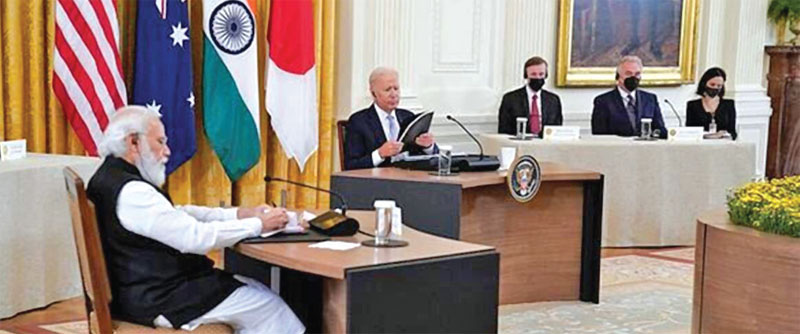Could AUKUS undermine QUAD in the long run?
In a joint televised address on 15 September 2021, the US, UK, and Australia launched a new trilateral security alliance for the Indo-Pacific to protect their shared interests and allow for greater sharing of defence capabilities. The alliance is called ‘AUKUS’ and would include helping Australia acquire nuclear-powered submarines with the help of the US and the UK. The new pact meant Australia dumping the agreement it signed with France in 2016 for 12 submarines.

Even as the US and Australia are both a part of the Quad alliance, the newly formed AUKUS alliance goes multiple steps ahead. While the Quad’s primary objective is maritime security, combating the Covid-19 crisis, especially vis-à-vis vaccine diplomacy, addressing the risks of climate change, creating an ecosystem for investment in the region and boosting technological innovation, the AUKUS, at least as of now, looks more clearly outlined with sharing of cyber capabilities, AI, quantum, and other undersea technologies.
Under AUKUS, the three countries will enhance the development of joint capabilities and technology sharing, foster deeper integration of security and defence-related science, technology, industrial bases, and supply chains. During the launch of AUKUS, the countries did not mention China, but spoke about the growing challenges in the Indo-Pacific.
Though India was taken by surprise by the AUKUS announcement, some experts believe that the AUKUS would not undermine QUAD. Harsh Pant says, “The AUKUS has not got anything to do with India. It’s a trilateral engagement between the countries that have traditionally been very close. The US, UK and Australia have been very close partners throughout history. The fact that US is willing to share a sensitive technology like the nuclear power submarine with Australia, reflects an underlined unease with Washington about the changing Indo-Pacific and the inability of its closest allies like Australia to stand up to China on their own. Australia clearly is no match to Chinese capabilities. Australia is facing its own China problem. They need critical technologies like these from their partners.”
“The UK, Australia and US are natural allies while we may be separated geographically, our interests and values are shared,” said British Prime Minister Boris Johnson. He added, “The AUKUS alliance will bring us closer than ever, creating a new defence partnership and driving jobs and prosperity. This partnership will become increasingly vital for defending our interests in the Indo-Pacific region and, by extension, protecting our people back at home.”
“The United States, Australia, United Kingdom have long been faithful and capable partners and we’re even closer today. Today, we’re taking another historic step to deepen and formalise cooperation among all three of our nations because we all recognise the imperative of ensuring peace stability in the Indo-Pacific over the long term,” US President, Joe Biden said.
Biden said AUKUS will bring together sailors, scientists, and industries to maintain and expand their edge and military capabilities and critical technologies such as cyber, artificial intelligence, quantum technologies, and undersea domains.
Biden added that under AUKUS, they were launching consultations with Australia’s acquisition of conventionally armed, nuclear-powered submarines for its navy. “I want to be exceedingly clear about this. We’re not talking about nuclear-armed submarines. These are conventionally armed submarines that are powered by nuclear reactors. This technology is proven, it’s safe, and the United States and the UK have been operating nuclear-powered submarines for decades,” Biden said.
“Recognising our deep defence ties, built over decades, today we also embark on further trilateral collaboration under AUKUS to enhance our joint capabilities and interoperability. These initial efforts will focus on cyber capabilities, artificial intelligence, quantum technologies, and additional undersea capabilities,” read the joint statement issued by the three countries.
Spokesperson of the Chinese embassy in the US, Liu Pengyu, said countries, “should not build exclusionary blocs targeting or harming the interests of third parties. In particular, they should shake off their Cold-War mentality and ideological prejudice.”
The AUKUS has raised eyebrows from several countries including India and France, the two countries that are considered closer to the US. Offended by the US and Australia for cancelling its submarine deal, France immediately recalled its ambassadors from the US and Australia for consultations. This points to the humiliation that France feels.
“It’s really a stab in the back. We had established a relationship of trust with Australia, this trust has been betrayed,” French foreign minister Jean-Yves Le Drian told France Info radio. “I’m very angry today, and bitter… this is not something allies do to each other,” he said. “This unilateral, sudden and unforeseeable decision very much recalls what Mr Trump would do,” Le Drian added.
For India too, this comes across as a shock. While India has maintained that Quad and AUKUS are not linked, several Indian defence experts have expressed concerns. While, both the US and Australia are a part of Quad, experts believe the deal could have been signed bilaterally. In the case of nuclear submarine deal, several experts also questioned why India couldn’t get such high-class technology from the US. Former navy chief Admiral Arun Prakash tweeted, ‘For years, US has been telling India that their laws make it impossible to share nuclear-propulsion tech with anyone, including allies. Even the Indo-US Nuclear deal & signing of all four ‘foundational agreements’ did not seem to matter. And now this…’
Also Read:
India and the World | Some Highs Some Lows
India-US relationship has been a rollercoaster ride until now

